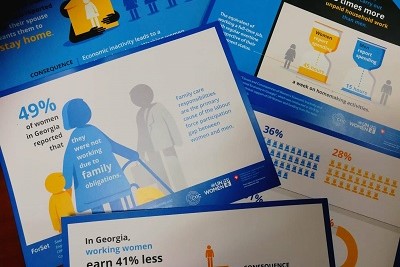UN Women and partners discuss study on the state of women’s economic empowerment
Date:
UN Women held a workshop with representatives of government agencies, CSOs and international organizations on a study analysing the low economic activity of women in Georgia, including the reasons for women’s engagement in the informal economy.

During the meeting, the stakeholders were informed about key findings and conclusions revealed by the study with regard to the economic activity of women in Georgia.
Commissioned by UN Women, CRRC-Georgia conducted the study in Georgia, Armenia and Azerbaijan with the financial support of the Swiss Agency for Development and Cooperation and within the framework of the project “Women’s Economic Empowerment in the South Caucasus”. Its preliminary results make it clear that only 50 per cent of women participate in Georgia’s workforce, compared to 79 per cent of men. At the same time, the employed women earn 41 per cent less revenue than men.
According to the study, the interviewed women reported allocating 45 hours per week to their domestic activities, the equivalent of a full-time job. This is in addition to any job they might have outside the home. Unlike women, the men reported spending 15 hours per week on household work.
During the workshop, the participants shared their recommendations and opinions to the authors of the study and to UN Women. They noted that, in order to enhance women’s economic activity, it will be important to encourage women to obtain an education in traditionally male-dominated sectors. Most of the participants mentioned STEM as there is a high demand for personnel, but women’s engagement is low. According to them, introducing scholarships in these subject areas specifically for women will increase their employment rate in the long run.
Elza Jgerenaia, one of the meeting participants, is the head of the Labour and Employment Policy Department of the Ministry of Labour, Health and Social Affairs of Georgia. She noted that the study results reveal valuable information: “Our agency is working on the Labour and Employment Policy Strategy and subsequent 2019-2020 Action Plan. This study is very important, and we will definitely take its results into account while developing the strategy.”
Opinions and recommendations expressed during the workshop will be captured in the research report, which will be finalized by the end of August 2018.